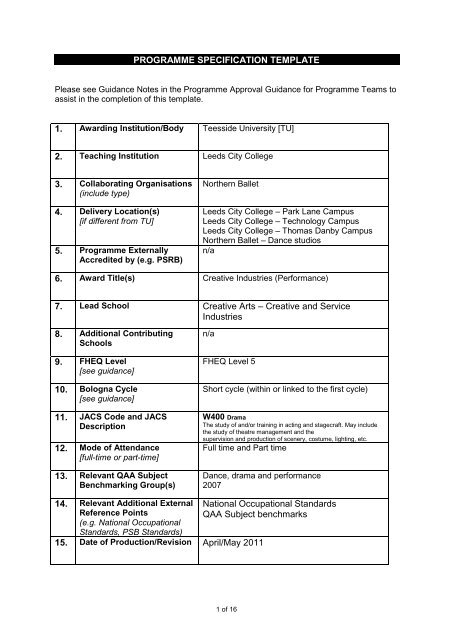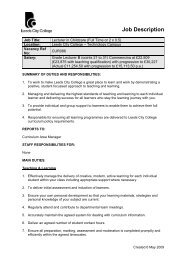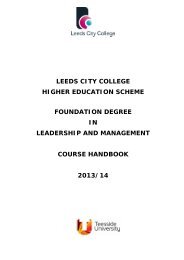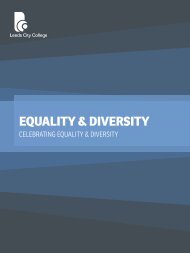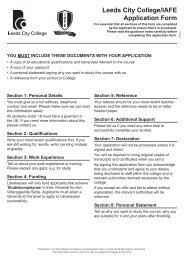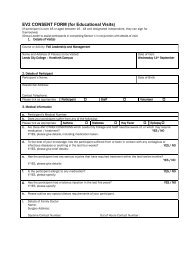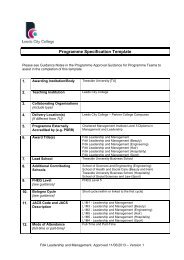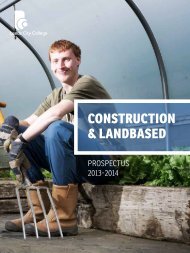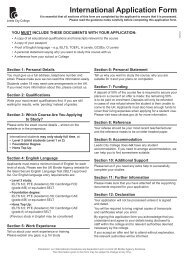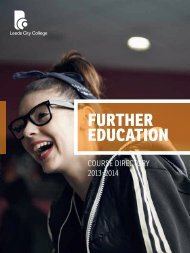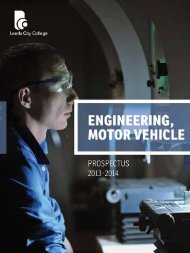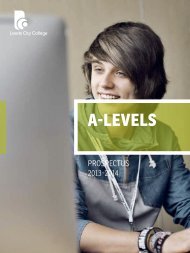PROGRAMME SPECIFICATION TEMPLATE 1. 2. 3. 4. 5. 6. 7 ...
PROGRAMME SPECIFICATION TEMPLATE 1. 2. 3. 4. 5. 6. 7 ...
PROGRAMME SPECIFICATION TEMPLATE 1. 2. 3. 4. 5. 6. 7 ...
Create successful ePaper yourself
Turn your PDF publications into a flip-book with our unique Google optimized e-Paper software.
<strong>PROGRAMME</strong> <strong>SPECIFICATION</strong> <strong>TEMPLATE</strong>Please see Guidance Notes in the Programme Approval Guidance for Programme Teams toassist in the completion of this template.<strong>1.</strong> Awarding Institution/Body Teesside University [TU]<strong>2.</strong> Teaching Institution Leeds City College<strong>3.</strong> Collaborating Organisations(include type)<strong>4.</strong> Delivery Location(s)[if different from TU]<strong>5.</strong> Programme ExternallyAccredited by (e.g. PSRB)Northern BalletLeeds City College – Park Lane CampusLeeds City College – Technology CampusLeeds City College – Thomas Danby CampusNorthern Ballet – Dance studiosn/a<strong>6.</strong> Award Title(s) Creative Industries (Performance)7. Lead School Creative Arts – Creative and ServiceIndustries8. Additional ContributingSchools9. FHEQ Level[see guidance]10. Bologna Cycle[see guidance]1<strong>1.</strong> JACS Code and JACSDescription1<strong>2.</strong> Mode of Attendance[full-time or part-time]1<strong>3.</strong> Relevant QAA SubjectBenchmarking Group(s)n/aFHEQ Level 5Short cycle (within or linked to the first cycle)W400 DramaThe study of and/or training in acting and stagecraft. May includethe study of theatre management and thesupervision and production of scenery, costume, lighting, etc.Full time and Part timeDance, drama and performance20071<strong>4.</strong> Relevant Additional ExternalReference Points(e.g. National OccupationalStandards, PSB Standards)1<strong>5.</strong> Date of Production/Revision April/May 2011National Occupational StandardsQAA Subject benchmarks1 of 16
1<strong>6.</strong> Criteria for Admission to theProgramme(if different from standardUniversity criteria)A typical offer is likely to be 120 tariff pointswhere this is made up of appropriate level 3qualifications, such as full A levels or BTEC L3Diploma. This could be translated as 2 x D at Alevel, or a Merit profile in a relevant BTECNational Diploma/Certificate, together with anumber of GCSE grades at C or above includingEnglish.However, factors such as previous experienceand performance at interview can affect the tariffpoints required for entry.17. Educational Aims of the ProgrammeThe overall aims of the programme are to:• Provide a challenging high quality vocational programme in Performance,including core and specialist modules, which facilitate access and progressionfor a wide range of students from diverse backgrounds.• Offer a robust foundation degree that is relevant to current (performance)practice in the creative industries, that will allow students to develop theirinterests personally and professionally• Develop graduates who have the ability to reflect and learn from theirworkplace experience in a performance context and relate this experience torelevant theory and practical projects• Develop graduates who have a balance between strong creative, expressive,and technical skills and transferable skills such as communication, teamworkand project management which are key to being successful in the CreativeIndustries• Develop graduates who have an analytical and reflective understanding ofperformance in the context of the workplace today and in relation to the widersocial and cultural environment.18. Learning OutcomesThe programme will enable students to develop the knowledge and skills listedbelow. On successful completion of the programme, the student will be able to:Knowledge and Understanding (insert additional rows as necessary)K1 Plan, undertake and evaluate a negotiated, self-managed major projectK2 Demonstrate a comprehensive and detailed knowledge of stylistic and/orbusiness development through critical analysis of the creative industriesK3 Be able to analyse and evaluate the impact of ethical and legal issuesrelevant to the generation of knowledge in the chosen sector of the creativeindustriesK4 Demonstrate a comprehensive and detailed knowledge of performancecomponents and be able to synthesise, critically appraise and evaluateappropriate knowledge / conceptsCognitive/Intellectual Skills (insert additional rows as necessary)C1 Question orthodoxy using balanced, logical and supported argumentC2Demonstrate intellectual flexibility and openness to new ideas in a creativecontext.2 of 16
C3C4Be confident and flexible in identifying and defining complex creative andpractical problems and the application of appropriate knowledge,tools/methods to their solutionQuestion orthodoxy using balanced, logical and supported argumentPractical/Professional Skills (insert additional rows as necessary)P1 Operate ethically in complex and unpredictable contexts, requiring selectionand application from a wide range of standard or innovative techniquesP2 Be able to operate autonomously with limited supervision or direction withinagreed guidelines and/or constraintsP3 Be able to use the voice effectively or in unpredictable ways thatdemonstrate an awareness of both the personal possibilities and dramaticimplications of the vocal dimension of performance.P4 Demonstrate the dimension of physical movement in the development ofperformance where there are complex choices or techniques that bringinnovation and creativity.Key Transferable Skills (insert additional rows as necessary)T1 Plan, manage and evaluate the acquisition of new knowledge and skills aspart of a lifelong learning strategyT2 Demonstrate both employment potential and ability to manage futureprofessional developmentT3 Communicate clearly, fluently and effectively in a range of styles appropriateto the context. Engage effectively in academic discussion and presentarguments in a professional manner.T4 Select, apply and evaluate appropriate numerical and statistical methods forcomplex and open-ended tasksT5 Select and evaluate software applications for different tasks within thecontext of the discipline as well as advanced technology linked toperformance.T6 Recognise and evaluate factors which enhance group processes and teamworking,and modify and evaluate own personal effectiveness within a team19. Key Learning & Teaching Methods• There is an emphasis towards practical workshop learning, which underpinboth context and industry relevant topics• The lecture programme will impart the necessary principles and concepts.• Group work will allow students to develop projects that include research,problem solving, peer reflection and other teamwork skills.• The seminars will be a mixture of student and tutor led sessions consideringpractical examples of the principles and concepts. This will support both widerknowledge base but also increase understanding through discussion andillustration.• Tutor and peer led reflective feedback form the basis of student developmentstrategies, through action planning of skill development, career aspirations andpersonal learning autonomy.• Tutorials will take the form of regular individual support and student guidance• Opportunities will be available to work within the creative industries using ourstrong links with working professionals.3 of 16
20. Key Assessment MethodsPractical performance work (process and performance)Reflective portfolio/logbooksResearch foldersPresentationsReport / EssaySeminar delivery; student feedback from research projects for group discussion.Group (project) preparation / planning/deliveryVivas4 of 16
2<strong>1.</strong> Programme Modules(additional copies to be completed for each named pathway)Level 4 Semester 1Code Title Credits StatusNon-CompensatableCompensatableActor tools 40 Programme Core Working in the Creative Industries 20 Pathway Core Industry Application 1: The rehearsal room 20 Programme Core Level 4 Semester 2Code Title Credits StatusNon-Compensatable CompensatableActor tools (continued) (continued) Programme Core Performance in Context 20 Programme Core Industry Application 2: Facilitation 20 Pathway Core Level 5 Semester 1Code Title Credits StatusNon-Compensatable CompensatableProduction Tools 20 Programme Core Interdisciplinary Project 20 Pathway Core Industry Application 3: Directing project 30 Programme Core Level Semester 2Code Title Credits StatusNon-Compensatable CompensatableProduction Tools (continue) (continued) Programme Core Independent Research Project 20 Pathway Core Industry Application 4: Public performance 30 Programme Core 5 of 16
2<strong>2.</strong> Programme StructureOverview of structure of the modules across the Academic Year.See ‘Structure Diagrams’ in separate fileFull-time route:Level 4:The programme has three simple building blocks: equipping the student with coreperformance tools, understanding contexts of performance genre and theircontexts, and experiencing the application of these skills and knowledge. Specificprojects will link the learning to the employment opportunities of the industry. Thefirst semester therefore aims to put down strong foundations in performance,rooting it into an awareness of theatre history (with applied extracts) starting at thevery beginning, and a unit that explores exactly what the contemporary creativeindustries are (with guest speakers from the industry). Actor Tools bridgessemester 1 and semester 2, continuing on a developmental process throughoutlevel 4, aiding retention. The second semester moves towards a morecontemporary perspective of performance both in terms of contextualunderstanding and performance tools needed. The industry application, however,is focussed around the need for a modern artist to be able to facilitate groups in aworkshop setting; a skill so often missed in modern training but actually where somany find themselves working very often. The cohesion and commitment of themodules ensure the student is fully engaged on a practical level which supportsgood retention.• Actor tools, 40 credits• Working in the Creative Industries, 20 credits• Industry Application 1: The rehearsal room,• Performance in Context, 20 credits• Industry application 2: Facilitation, 20 creditsLevel 5:This next level challenges the student towards being an independent learner.Again with careful equipping of practical tools (including technical), the student isgiven a group of actors and challenged with directing them towards aperformance. Obviously this requires a whole range of skills and draws onconcepts that have been embraced or rejected as an individual choice. Equally itrequires personal organisation, the ability to lead and communicate and develop acreative voice. Alongside this, the student will be working towards aninterdisciplinary product which is particularly challenging for the ability to think in acreative and lateral way. The complexity of these projects and the sense ofpersonal achievement come at a key moment in the delivery of the course andensure that students find a mature level of commitment. This is then brought to astrong completion with their final project which is to perform once more as actorsunder the direction of a professional in a public space.• Production Tools, 20 credits• Interdisciplinary Project, 20 credits• Industry Application 3: Directing project, 30 credits• Independent Research Project, 20 credits• Industry Application 4: Public performance, 30 credits6 of 16
A part-time route can be negotiated up to a maximum of six years of study, as inthe example below:Year 1:• Actor tools, 40 credits• Industry application 2: Facilitation, 20 creditsYear 2:• Working in the Creative Industries, 20 credits• Industry Application 1: The rehearsal room, 20 credits• Performance in Context, 20 creditsYear 3:• Interdisciplinary Project, 20 credits• Production Tools, 20 credits• Independent Research Project, 20 creditsYear 4:• Industry Application 3: Directing project, 30 credits• Industry Application 4: Public performance, 30 creditsOther part-time models are possible (working to a maximum of 100 credits in anyone year), which can allow students to study over a shorter period of time. Thecurrent recommendation is a norm of 80 credits per year.2<strong>3.</strong> Support for Students and Their Learning• Tailored induction support begins before students arrive with theadmissions team, and is reinforced in detailed induction programme• A robust communications system functions to give students access tolecturers and management; this includes e-mail, the VLE and noticeboards in studios.• All necessary information about the programme is provided by means ofthe student handbook, module handbooks and the VLE.• Each student is allocated a tutor for regular tutorials and personaldevelopment planning. This is implemented in the first semester andcontinued throughout the two years of study• There is an extensive range of learning resources in the Library, supportedby specialist staff who provide bespoke study skills sessions for students.• The University provides an extensive range of services for students,including support for those with special needs• There is a range of student services such as welfare, counselling, financialand careers advice7 of 16
• There is a student union that provides recreational and support facilities2<strong>4.</strong> Distinctive Features• An emphasis on the balance between core actor skills and a range ofindustry focused projects, building students that have the tools to succeedwithin employment with appropriate transferable skills• Students have access to an excellent range of facilities including: apurpose built theatre with rehearsal space, props and costume facilities,TV/photographic studio, a fully equipped dance studio and rehearsal /seminar rooms• The double pathways of Dance and Performance offer the opportunity towork across disciplines. This provides an innovative and contemporaryexploration of creative approaches and is particularly evidenced within the‘Interdisciplinary Project’ module• Strong teaching team in terms of industry experience and academicqualifications• We have a strong network of professionals from the creative industrieswho connect with the course and provide opportunity for enhancement ofstudent experience• The urban district of Leeds and Bradford offers a wonderful range ofcultural and theatre venues and companies that the students can access8 of 16
Learning outcomes gridsThe charts below set out the Learning Outcomes to be assessed in each course module, and area useful guide for understanding how the course assessment is structured.Knowledge and Understanding Assessment ChartsKnowledge and UnderstandingLevel 4Identify and justify selected research methods usedin the chosen sector of the creative industries andapply them in defined and limited contextsActor tools1Working inthe CreativeIndustriesIndustryapplication1Performance inContextIndustryapplication2Describe and explain the key aspects of the chosendiscipline and / or job role within the creativeindustries and the context in which they weredeveloped or applied.Identify and explain the role of ethics in theexploration of knowledge as it applies to your projectwithin the chosen sector of the creative industries.Describe and explain the use of key aspects ofperformance and how they are developed.Cognitive/Intellectual SkillsLevel 4Show an ability to gather, record and describe, withguidance, evidence from a range of sourcesJustify conclusions in defined and limited contextsRecognise the way that ideas and concepts in thechosen sector of the creative industries areconstantly changing and evolvingGiven tools/methods can be accurately andappropriately applied to a well-defined creativeproblem with an emerging appreciation of levels ofcomplexity.Actor tools 1Working in theCreativeIndustriesIndustryapplication 1Performancein ContextIndustryapplication 2 Practical/Professional SkillsLevel 4Be able to utilise a specified range of techniquesappropriately and with some skill within a well definedcontext of the creative industry.Actor tools1Working inthe CreativeIndustriesIndustryapplication1Performance in ContextIndustryapplication2Be able to show some limited autonomy, underdirection or supervision, within defined guidelines1 of 16
Be able to utilise a range of vocal techniques as apersonal programme of exercises and/ortext/performance applicationShow a specific awareness and application ofmovement as an ingredient of performance withindefined contexts both as an individual and as agroup.Key Transferable SkillsLevel 4Identify own learning strengths and areas fordevelopment using feedback from assessments andcreate a clear strategy for personal improvement.Identify and articulate personal skills, abilities,interests and motivations and relate these to careeropportunitiesDemonstrate the use of communication skills not onlyas a performer but also as a facilitator, in discussion,or in the conveying of information in varying contexts.This may be oral, visual, written or multi dimensional.Demonstrate an ability to understand the applicationof simple numerical and statistical skills in variousaspects of the creative industry practice.Use basic IT tools (e.g. word-processing;spreadsheets; information searching) or basictechnology linked to the creative industry in tutordefinedcontextsDemonstrate an ability to work effectively with othersto advance a group learning experience or tocomplete a project.Actor tools1Working inthe CreativeIndustriesIndustryapplication1Performance in ContextIndustryapplication2Knowledge and UnderstandingLevel 5Apply the skills of a range of research/enquiry-basedapproaches in the generation of complex knowledge,showing critical awareness of reference sourceBe able to critically discuss ingredients of the chosendiscipline and / or job role within the creativeindustries, demonstrating knowledge of their link tohistorical, cultural and socio-political developmentsProductionToolsInterdisciplinary ProjectIndustryapplication 3IndependentResearchProject Industryapplication 42 of 16
Appraise the implications of legal and ethical issuesrelevant to the exploration of knowledge in a tasklinked with the chosen sector of the creativeindustriesDemonstrate a detailed knowledge of components ofperformance and the processes by which it is createdand realised.Cognitive/Intellectual SkillsLevel 5ProductionToolsInterdisciplinary ProjectIndustryapplication 3IndependentResearchProjectShow an ability to analyse, apply and interpretevidence from a variety of sources Be able to employ balanced, logical and supportedargument in a range of contexts Industryapplication 4Demonstrate intellectual flexibility and openness tonew ideas Can identify key areas of both creative and practicalproblems and choose appropriate tools/methods fortheir resolution in a considered mannerPractical/Professional SkillsLevel 5Be able to operate in situations of varying complexityand predictability requiring the application of agrowing range of techniques that are appropriate andethically soundBe able to operate with increasing autonomy, withreduced need for supervision and direction, withindefined guidelinesBe able to use the voice in response to a growingcomplexity of genre demands both in terms of rangeof techniques and dynamics of performanceDemonstrate a development of physical awarenessas an actor or as a director/facilitator in theexpressive potential of the body with a growing rangeof technique and personal application.ProductionToolsContext 3Industryapplication3 Independent ResearchProject Industryapplication4Key Transferable SkillsLevel 5ProductionToolsInterdisciplinary ProjectIndustryapplication3Independent ResearchProjectIndustryapplication4Reflect systematically on aspects of the learningprogramme and show a strategy for ownership ofpersonal development.3 of 16
Demonstrate a realistic match between careeraspirations and personal aptitudes, interests andmotivationsSelect and utilise a range of appropriatecommunication skills not only as a performer but alsoas a facilitator, in discussion, or in the conveying ofinformation in varying contexts. Be able evaluatepersonal competency with insight.Demonstrate an ability to apply numerical andstatistical skills in an appropriate and effective waywithin a context of some complexity within theindustry.Demonstrate both competency and appropriatenessin the use and selection of IT software or technologyin the delivery of a projectNegotiate a role or roles within a group enterpriseand fulfill successfully your responsibility. Be able toshow effective exchange and contribution within thegroup dynamic.4 of 16
Assessment gridsFoundation Degree in Creative Industries 2011 / 2013 (Performance)Module Assessment 1 Assessment 2Actor ToolsPractical 70% Inventory and reflection portfolio 30%(40 credit)Working in the Creative Industries(20 credit)Portfolio of Research 60% Presentation 40%Performance in Context(20 credit)Industry Application 1:The Rehearsal Room (20 credit)Industry Application 2: Facilitation (20credit)Portfolio of Research 40% Essay 60%Practical 70% Workbook 30%Workbook 40% Practical 60%Production Tools(20 credit)Interdisciplinary Project(20 credit)Independent Research Project(20 credit)Industry Application 3: Directing Project(30 credit)Industry Application 4:Public Performance(30 credit)Portfolio of evidence 40% Practical 60%Reflective Written Work 30% Project 70%Research folder 20% Essay 80%Practical Project 60% Presentation 40%Rehearsal Process 70% Performance 30%1 of 16
Assessment timetableFoundation Degree in Creative Industries (Performance) Level 4Semester 1DATE Performance tools 1 Working in theCreative IndustriesTBCTBCTBCTBCTBCTBCTBCSemester 2DATE Performance tools 2 Performance inContextTBCTBCTBCTBCTBCTBCTBCIndustry application 1Industry application 2Foundation Degree in Creative Industries (Performance) Level 5Semester 1DATE Performance tools 3 InterdisciplinaryProjectTBCTBCTBCTBCTBCTBCTBCSemester 2DATE Performance tools 4 IndependentResearch ProjectTBCTBCTBCTBCTBCTBCTBCIndustry application 3Industry application 41 of 16
2 of 16
3 of 16


